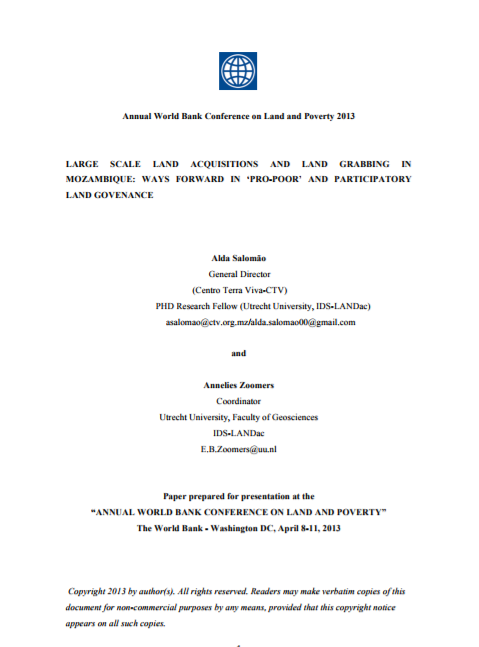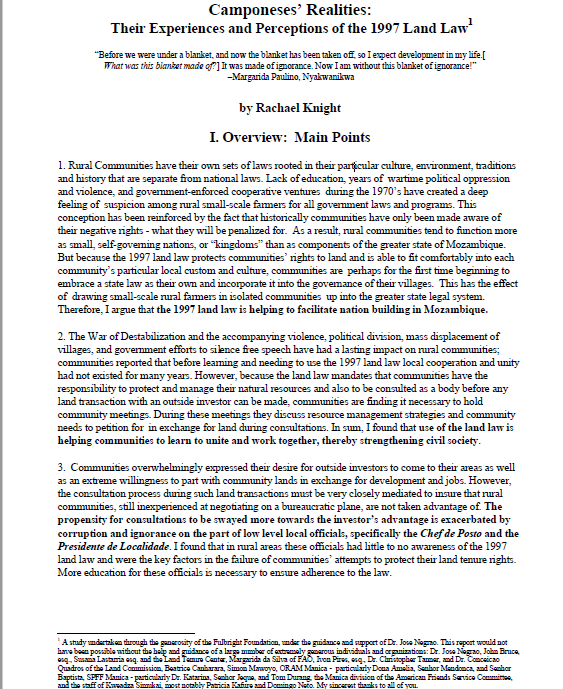Namati: Innovations in Legal Empowerment
Namati is an international organization that tests the potential of legal empowerment through innovative interventions and research. Through our work, we seek a better understanding of the impacts of legal empowerment and the most effective mechanisms for achieving them.
As a means of cultivating a more robust movement for legal empowerment, Namati also hosts a growing Global Legal Empowerment Network of practitioners and supporters. Network members are active in every continent in the world, whereas Namati’s programs and research focus on exploring the potential of legal empowerment in specific countries, including Sierra Leone, India, Liberia, Mozambique, and Uganda.
Mission: Building a movement of grassroots legal advocates
Resources
Displaying 51 - 55 of 69Large Scale Land Acquisitions in Mozambique: Ways Forward in ‘Pro-Poor’ and Participatory Land Governance
In international debates about land governance, Mozambique is often mentioned as an example of a country with favorable framework for local communities to benefit from landbased investments. However, it is also one of the countries highlighted in land grab debates for being one of the top countries where foreign companies and national elites are acquiring large extensions of land. It is increasingly clear that in spite of the favorable legal framework and pro-poor policies, local communities are under stress.
Protecting Community Lands and Resources. Evidence from Liberia, Mozambique and Uganda (Executive Summary)
A community land titling initiative designed to protect community lands from land grabbing. Supported communities in Liberia, Mozambique and Uganda to follow their countries’ community land registration laws. Sought to understand what type and level of support was most effective. Concludes that community land documentation may be a more efficient method of land protection that individual and family titling, and should be prioritized in the short term.
Camponeses Realities - Their Experiences and Perceptions of the 1997 Land Law
Rural Communities have their own sets of laws rooted in their particular culture, environment, traditions and history that are separate from national laws. Lack of education, years of wartime political oppression and violence, and government-enforced cooperative ventures during the 1970’s have created a deep feeling of suspicion among rural small-scale farmers for all government laws and programs. This
conception has been reinforced by the fact that historically communities have only been made aware of
Renforcement des infrastructures d'approvisionnement en eau et d'assainissement de la ville secondaire de Khas
F.a: Strengthening and realization of indigenous peoples? biocultural rights with community protocols in Kenya
General
The indigenous communities in Kenya have continuously been losing their living areas for activities like forestry, agriculture and mining, or expansion of conservation areas. In addition, outside communities have taken over lands belonging to indigenous peoples. Through these processes, the communities' cultural tradition and natural resource base have been eroded. In this project, the Ogiek, Sengwer, Endorois and Elmolo communities have joined forces in an effort to strengthen their biocultural continuity and push for the rights of indigenous peoples locally, nationally and internationally ? utilizing among other things the international conventions and treaties supporting the rights of the indigenous peoples. This project strengthens the communities' land rights and the protection of biodiversity with the help of community biocultural protocols. They document the cultural structures, management systems and procedures based on the communities' traditional knowledge, their territories and natural resources, assess the challenges facing these, and outline legal and political instruments to strengthen the protection of the community interests. During the implementation of the project and on the basis of its outputs, the understanding of the legal rights of the communities in question and their cultural characteristics will also be increased among key stakeholders (such as the government authorities, the research community and civil society actors). The Ogiek and Sengwer are traditionally hunter-gatherer communities, the Endorois nomads and the Elmolo fishermen. The project presentation is partly a continuation of a project previously supported by Siemenpuu in 2020-21. In this project, for the Ogiek and Sengwer, the aim is to utilize the biocultural protocols prepared in the previous project in the rights related advocacy work. The protocol of the Sengwers is also updated based on the current situation of the community. The biocultural protocol of the Endorois community drawn up in 2019 will be updated. Regarding the Elmolo community, a community protocol will be prepared for them. The project will be implemented in Nakuru, Narok, Baringo, Uasin Gishu, Kericho, Nandi, Trans Nzoia, Elgeyo Marakwet and Marsabit counties. The project is estimated to have approx. 6,000 direct beneficiaries, half of whom are women. The project is implemented by Ogiek Peoples? Development Program (OPDP); https://ogiekpeoples.org/.







